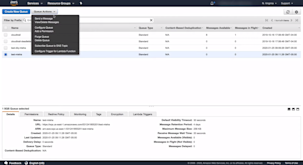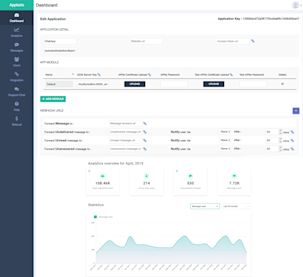Amazon SQS vs Applozic
This Amazon SQS vs Applozic comparison was created based on reviews from developers and our best attempts to perform analysis by looking at documentation and other publicly available resources.
Easily build complete, trusted realtime functionality.
Take our APIs for a spin Amazon SQS |  Applozic | |
|---|---|---|
| Getting started and developer experience | ||
Time to "hello world" Reviewed by 3+ independent developers Ratings were given based on the average amount of time it takes to sign up to a new account and publish the first message. | 4 / 5 5 = <30 min | 4 / 5 5 = <30 min |
Demos / Tutorials A selection of online demos and tutorials so you can test and see the code in action. Explore Ably's tutorials for our pub/sub messaging platform | ||
Documentation Reviewed by 3+ independent developers Explore Ably's documentation for our pub/sub messaging platform | 4 / 5 Getting started guides / 5 Information architecture and developer journey / 5 API reference documentation / 5 Readability, design and navigation / 5 Quality of code / 5 Breadth and quality of tutorials / 5 “The information architecture is largely intuitive and helpful, which makes it easy to navigate through docs. From a content perspective, the documentation is good - instructions are generally clear and don’t leave room for interpretation. The getting started guide is easy to follow - if anything, the process is a bit tedious due to the number of steps involved. The code samples are good throughout. Official docs don’t contain a lot of tutorials - there’s barely any. It would have been good to see (more) use case-focused tutorials and demos. You can easily forget about the API reference, which is only listed on the docs homepage, but it’s not referenced in the developer guide at all.” | 4.50 / 5 Getting started guides / 5 Information architecture and developer journey / 5 API reference documentation / 5 Readability, design and navigation / 5 Quality of code / 5 Breadth and quality of tutorials / 5 Documentation is detailed and clear. It includes an API explorer to read API documentation and test the APIs. Navigation is also quite good both on mobile and desktop view. However, there aren’t many tutorials on Applozic available, and the developer journey could be improved. For example, the tutorials are not grouped by SDKs but by features which can be overwhelming. |
Dashboard or dev console Reviewed by 3+ independent developers Sign up for free and explore Ably's pub/sub messaging platform | 5 / 5 Ease of use / 5 Stats and reports / 5 Functionality / 5  “The Amazon SQS console allows you to perform queue-related CRUD operations easily. In addition, for each queue, you can manage various settings, such as Lambda triggers, access policy, or encryption. The console also allows you to monitor various metrics, such as the size of messages added to a queue or the number of messages available for retrieval from a queue. The functionality is intuitive, and the dev console is pretty easy to use once you learn your way around it a bit. As a minus, the UI, while simple, is quite boring and dry”. | 4 / 5 Ease of use / 5 Stats and reports / 5 Functionality / 5  The dev console has a minimalistic design and is easy to navigate, allowing you to manage and configure your pub/sub pipeline. It sufficiently intuitive to use even for new starters, with a stats and reports screen, although they're bare-minimum and can be improved upon. It doesn’t cover the configuration and testing of real time data. And is not very mobile-friendly. |
SDKs Note: Only official SDKs were taken into account. Explore Ably's 25+ SDKs for our pub/sub messaging platform | 9 SDKs Including:
| 6 SDKs Including:
|
API structure Reviewed by 3+ independent developers | 4 / 5 API consistency across SDKs / 5 Well structured / 5 Intuitive / 5 Simple / 5 “The Amazon SQS APIs are well described, intuitively named, and overall easy to understand. The API structure is decently consistent and simple across all SDKs. The API reference is well put together and helps you understand all the various operations and actions you can perform.” | 4.50 / 5 API consistency across SDKs / 5 Well structured / 5 Intuitive / 5 Simple / 5 The Applozic API is not very consistent across SDKs. Mobile SDKs make up the larger percentage of Applozic’s SDKs and each implementation has obvious inconsistency. You might need to spend some time looking into the APIs and trying to piece together how it fits together with each other. The methods across the mobile SDKs are in line with each other; the web methods, not so much. |
 Amazon SQS |  Applozic |
|---|---|
| "Hello world" code example | |
| |
 Amazon SQS |  Applozic | |
|---|---|---|
| Realtime features | ||
Pub/Sub messaging Pub/Sub is a design pattern that lets any number of publishers (producers) push messages to channels (also known as topics). Multiple subscribers (consumers) can subscribe to a channel to consume published messages. Explore Ably's pub/sub messaging implementation | ||
Message queues A message queue is a form of asynchronous service-to-service communication. Messages are stored on a queue until they are processed. Note that each message is only consumed by one subscriber (consumer). Explore Ably's message queues implementation | ||
Presence Presence enables you to track the online and offline status of devices and end-users in real time and to store their state. Essential for chat apps and multiplayer games. Explore Ably's presence implementation | ||
Message history Message history provides a means to retrieve previously published messages. For this to be possible, message data must be stored (persisted) somewhere. Explore Ably's message history implementation | ||
Connection state recovery (stream resume) In the case of unreliable network conditions, clients may suddenly disconnect.Connection state recovery ensures that when they reconnect, the data stream resumes exactly where it left off. Explore Ably' s connection state recovery implementation | ||
Guaranteed message ordering Ordering ensures that messages are delivered to consumers in the same order that producers publish them. Explore Ably' s guaranteed message ordering implementation | ||
Exactly-once semantics Exactly-once is a system-wide data integrity guarantee that ensures each message is delivered to consumers exactly-once. Explore Ably' s idempotent publishing implementation | Unknown | |
Message delta compression Message delta compression enables you to only send the changes from the previous message to subscribers each time there’s an update, instead of the entire message. Useful for use cases where there is a significant degree of similarity between successive messages. Explore Ably' s message delta compression implementation | ||
Native push notifications Native push notifications can be used to deliver messages even when clients are offline. Useful for geolocation updates or news alerts. Explore Ably's push notifications implementation | ||
Webhooks Webhooks provide a mechanism to get messages and other types of events (such as clients entering or leaving channels) pushed to your servers over HTTP. Explore Ably's webhooks implementation | ||
Serverless functions A serverless function is essentially an isolated, single-purpose piece of code that is only executed when it’ triggered by an event. For example, you can use serverless functions to send a welcome message to clients when they become present on chat channels. Note that serverless functions are usually fully managed by cloud vendors. Explore Ably's serverless functions implementation | Limited Can only trigger AWS Lambda functions. Amazon SQS doesn’t have in-built support for other serverless platforms, such as Azure Functions or Google Cloud Functions. | Unknown |
Built-in integrations Which popular services & systems are Amazon SQS and Applozic integrated with? Explore Ably's library of integrations | Webhooks
Serverless functions
Streaming
| Webhooks
Serverless functions
Streaming
|
Known limits and constraints Find out practical limits, such as the maximum message size, or the maximum number of concurrent connections. Explore the practical limits of the Ably pub/sub messaging platform | Message throughput - Standard queues: nearly unlimited number of API calls per second per API action - FIFO queues: 300 API calls per second per API method (3000 transactions per second if you use batching). Maximum message size 256 KB Maximum number of queues Unlimited Maximum number of connections By default, a single SQS client has a connection limit of 50 connections. When more than 50 connections are used, the endpoint connections will get queued up, and performance might decrease. | Publisher throughput 60.000.000 kB per minute (1.000 MB/s) Maximum message size 10MB Maximum number of topics N/A Maximum number of connections Same as the Monthly Active Users for the pricing plan you’re on. |
| Supported development platforms, languages, open protocols and cloud models | ||
|---|---|---|
Development platforms & operating systems Which popular development platforms and operating systems do Amazon SQS and Applozic support via official SDKs? Explore the development platforms supported by Ably |
|
|
Languages Which popular programming languages do Amazon SQS and Applozic support via offical SDKs? Explore the programming languages supported by Ably |
|
|
Open protocols Which popular open protocols do Amazon SQS and Applozic support? Explore the open protocols supported by Ably |
|
|
Cloud models Which popular cloud models do Amazon SQS and Applozic support? |
|
|
| Global and reliable edge service | ||
|---|---|---|
Edge messaging network with latency-based routing Latency-based routing ensures that clients are always routed to the nearest datacenter and point of presence. Explore Ably's routing mechanism that mitigates network and DNS issues | ||
Multi-region data replication (message durability) Multi-region data replication (storage) protects against single points of failure and ensures message data durability. Learn how Ably ensures message durability | ||
Uptime SLAs Here’s what the most common SLAs amount to in terms of downtime over a calendar year: 99.999% SLA = 5m 15s downtime per year 99.99% SLA = 52m 35s downtime per year 99.95% SLA = 4h 22m 58s downtime per year 99.9% SLA = 8h 45m 56s downtime per year 99% SLA = 3d 15h 39m 29s downtime per year Source: https://uptime.is/ | 99.9% | 99.90% uptime |
Quality of Service What QoS guarantees do Amazon SQS and Applozic provide natively? Explore Ably's availability and uptime guarantees for our pub/sub messaging platform |
|
|
| Security | ||
|---|---|---|
API key authentication The simplest way to authenticate. Involves using private API keys that you can usually create and edit via a dashboard. Recommended to be used server-side, as private API keys shouldn’t be shared with untrusted parties. Explore Ably's implementation of API key authentication | ||
Token-based authentication Which popular token-based authentication mechanisms do Amazon SQS and Applozic support? Note that token-based authentication is usually the recommended strategy on the client-side as it provides more fine-grained access control and limits the risk of credentials being compromised. Explore Ably's implementation of token-based authentication |
|
|
Configurable rules and permissions Which types of configurable rules and permissions do Amazon SQS and Applozic support? Explore Ably's configurable rules and permissions |
|
|
Message encryption Which types of message encryption do Amazon SQS and Applozic support? Explore Ably's message encryption mechanisms |
|
|
Formal certifications Which formal certifications are Amazon SQS and Applozic compliant with? Explore Ably's security and compliance for our pub/sub messaging platform |
|
|
| Pricing & Support | ||
|---|---|---|
Free package What do the free packages offered by Amazon SQS and Applozic consist of? Explore Ably's free package for our pub/sub messaging platform | 1 million Amazon SQS requests for free each month. | Not bad Applozic offers a 30 day free trial, where users get unlimited access to all its features. |
Pricing model How are the Amazon SQS and Applozic pricing models calculated? Explore Ably's pricing model for our pub/sub messaging platform | Beyond the 1 million free Amazon SQS requests each month (which applies to all customers), the monthly cost of requests is calculated as such: - $0.40 per 1 million requests (Standard Queues) - $0.50 per 1 million requests (FIFO Queues) Data transfer out of Amazon SQS is also charged. The first GB / month is free. Pricing varies depending on region and volume of data. For example, in US East (Verizon) - Boston, the price for the next 9.999 TB / month is $0.108 per GB. | Beyond the free trial, Applozic offers a Growth plan with the price of $149, and a Pro plan with the price of $499. |
Enterprise package What benefits do the Amazon SQS and Applozic enterprise packages offer? Explore Ably's enterprise package for our pub/sub messaging platform | There is no Amazon SQS - specific enterprise package. | Applozic offers a Premium Support package. Key benefits
|
Community Reviewed by 3+ independent developers Explore Ably's community support channel for our pub/sub messaging platform | 3.50 / 5 Presence on multiple channels / 5 Size and activity / 5 “As we all know, overall, Amazon has a strong and diverse online community that spans various platforms and websites, like Reddit, Stack Overflow, or the AWS forums. With that in mind, the SQS community is not as active or helpful as you’d expect. For example, if you look at the Amazon SQS AWS forum, you will notice there are not that many questions asked over the past year. And while the published questions can get hundreds or even thousands of views, most of them barely have a few replies, if any at all.” | 3 / 5 Presence on multiple channels / 5 Size and activity / 5 There are a few questions answered on StackOverflow, and you can ask questions is by contacting their support via the website, but Applozic doesn’t have a strong presence online. There are not too many tutorials and the developer community is small. Of all the repositories on GitHub, the Applozic-Android-SDK repository has the highest numbers of stars with 612. |
Support What types of support options and response times do Amazon SQS and Applozic offer? Explore Ably's support options for our pub/sub messaging platform | General support options Email, support ticket, phone, technical documentation, community support (e.g. forums or Stack Overflow). Enterprise support Amazon offers an enterprise package, which includes 24/7 phone, email, and chat access to Cloud Support Engineers, Infrastructure Event Management support, and a designated technical account manager. Response time < 24 hours for general guidance queries < 1 hour for Production system down incidents (only applies to Business & Enterprise support packages). | General support channels Email, call, support ticket, phone, technical documentation, Stack Overflow community. Enterprise support The enterprise package includes 24/7, support via chat or call, and also a dedicated CSM. Response time 4 hours response time for Enterprise customers 8 hours response time for Growth and Starter customers |
Disclaimer: The information presented for Amazon SQS was last updated on 16 October 2020 and on 28 February 2021 for Applozic. It is possible that some details may now be out of date. If you think that’s the case, please let us know so we can update them. In any case, you should not rely solely on the information presented here and must check with each provider before deciding to integrate or buy any of these two solutions.
View more comparisons
More to explore
About Ably
Ably is an enterprise-ready pub/sub messaging platform. We make it easy to efficiently design, quickly ship, and seamlessly scale critical realtime functionality delivered directly to end-users. Everyday we deliver billions of realtime messages to millions of users for thousands of companies.
Compare packages
Documentation
Rapidly build production-ready realtime capabilities with quickstart guides, realtime concepts, and full API reference.
Read the docs
Compare our tech
View more comparisons between Ably and other realtime messaging solutions and see why we are clearly the better choice.
View all comparisons



